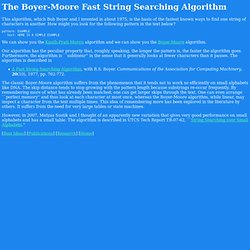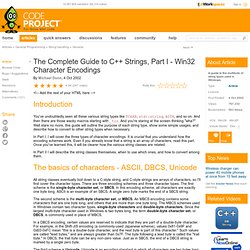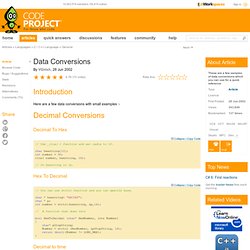

The Boyer-Moore Fast String Searching Algorithm. This algorithm, which Bob Boyer and I invented in about 1975, is the basis of the fastest known ways to find one string of characters in another.

How might you look for the following pattern in the text below? Pattern: EXAMPLE text: HERE IS A SIMPLE EXAMPLE We can show you the Knuth-Pratt-Morris algorithm and we can show you the Boyer-Moore algorithm. Our algorithm has the peculiar property that, roughly speaking, the longer the pattern is, the faster the algorithm goes. Furthermore, the algorithm is ``sublinear'' in the sense that it generally looks at fewer characters than it passes.
A Fast String Searching Algorithm, with R.S. However, in 2007, Matyas Sustik and I thought of an apparently new variation that gives very good performance on small alphabets and has a small table. [Best Ideas] [Publications] [Research] [Home] The Complete Guide to C++ Strings, Part I - Win32 Character Enco. Introduction You've undoubtedly seen all these various string types like TCHAR, std::string, BSTR, and so on.

And then there are those wacky macros starting with _tcs. And you're staring at the screen thinking "wha? " Well stare no more, this guide will outline the purpose of each string type, show some simple usages, and describe how to convert to other string types when necessary. In Part I, I will cover the three types of character encodings. In Part II I will describe the string classes themselves, when to use which ones, and how to convert among them. The basics of characters - ASCII, DBCS, Unicode All string classes eventually boil down to a C-style string, and C-style strings are arrays of characters, so I'll first cover the character types. The second scheme is the multi-byte character set, or MBCS.
In a DBCS encoding, certain values are reserved to indicate that they are part of a double-byte character. The third scheme is Unicode. Wchar_t wch = L'1'; wchar_t* wsz = L"Hello"; 1. . Data Conversions - The Code Project - C++ / MFC. Introduction Here are a few data conversions with small examples :- Decimal Conversions Decimal To Hex char hexstring[10]; int number = 30; itoa( number, hexstring, 16); Hex To Decimal char * hexstring= "ABCDEF"; char * p; int number = strtol(hexstring, &p,16); bool HexToDecimal (char* HexNumber, int& Number) { char* pStopString; Number = strtol (HexNumber, &pStopString, 16); return (bool)(Number !

Decimal to time char *DecToTime(float fTime, char *szTime) { int nHrs, nMin, nSec; fTime *= 3600; nHrs = (int)fTime / 3600; nMin = (int)(fTime - nHrs * 3600) / 60; nSec = (int)(fTime - nHrs * 3600 - nMin * 60); wsprintf(szTime, "%02d.%02d.%02d Hrs.Min.Sec String Conversions String to Hex sscanf(string, %04X, &your_word16); Hex to CString CString Str; unsigned char Write_Buff[1]; Write_Buff[0] = 0x01; Str.Format("0x0%x",Write_Buff[0]); COleVariant to CString CString strTemp; COleVariant Var; Var = "FirstName"; strTemp = Var.bstrVal; AfxMessageBox(strTemp); CString to char pointer char pointer to CString.